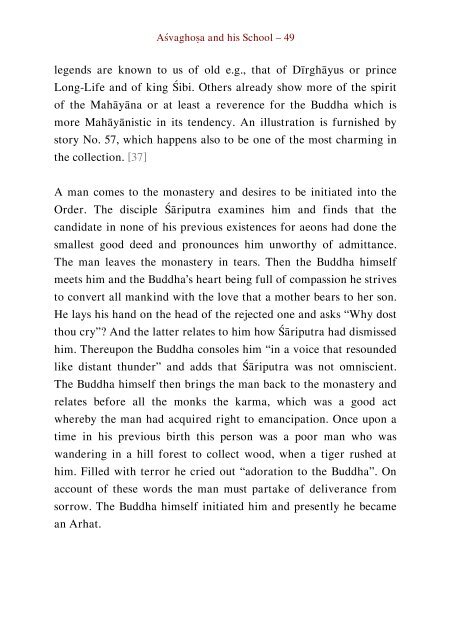Literary History of Sanskrit Buddhism
A study by J. K. Nariman of Sanskrit Buddhism from the Early Buddhist Tradition up to the Mahayana texts proper.
A study by J. K. Nariman of Sanskrit Buddhism from the Early Buddhist Tradition up to the Mahayana texts proper.
Create successful ePaper yourself
Turn your PDF publications into a flip-book with our unique Google optimized e-Paper software.
Aśvaghoṣa and his School – 49<br />
legends are known to us <strong>of</strong> old e.g., that <strong>of</strong> Dīrghāyus or prince<br />
Long-Life and <strong>of</strong> king Śibi. Others already show more <strong>of</strong> the spirit<br />
<strong>of</strong> the Mahāyāna or at least a reverence for the Buddha which is<br />
more Mahāyānistic in its tendency. An illustration is furnished by<br />
story No. 57, which happens also to be one <strong>of</strong> the most charming in<br />
the collection. [37]<br />
A man comes to the monastery and desires to be initiated into the<br />
Order. The disciple Śāriputra examines him and finds that the<br />
candidate in none <strong>of</strong> his previous existences for aeons had done the<br />
smallest good deed and pronounces him unworthy <strong>of</strong> admittance.<br />
The man leaves the monastery in tears. Then the Buddha himself<br />
meets him and the Buddha’s heart being full <strong>of</strong> compassion he strives<br />
to convert all mankind with the love that a mother bears to her son.<br />
He lays his hand on the head <strong>of</strong> the rejected one and asks “Why dost<br />
thou cry”? And the latter relates to him how Śāriputra had dismissed<br />
him. Thereupon the Buddha consoles him “in a voice that resounded<br />
like distant thunder” and adds that Śāriputra was not omniscient.<br />
The Buddha himself then brings the man back to the monastery and<br />
relates before all the monks the karma, which was a good act<br />
whereby the man had acquired right to emancipation. Once upon a<br />
time in his previous birth this person was a poor man who was<br />
wandering in a hill forest to collect wood, when a tiger rushed at<br />
him. Filled with terror he cried out “adoration to the Buddha”. On<br />
account <strong>of</strong> these words the man must partake <strong>of</strong> deliverance from<br />
sorrow. The Buddha himself initiated him and presently he became<br />
an Arhat.


















